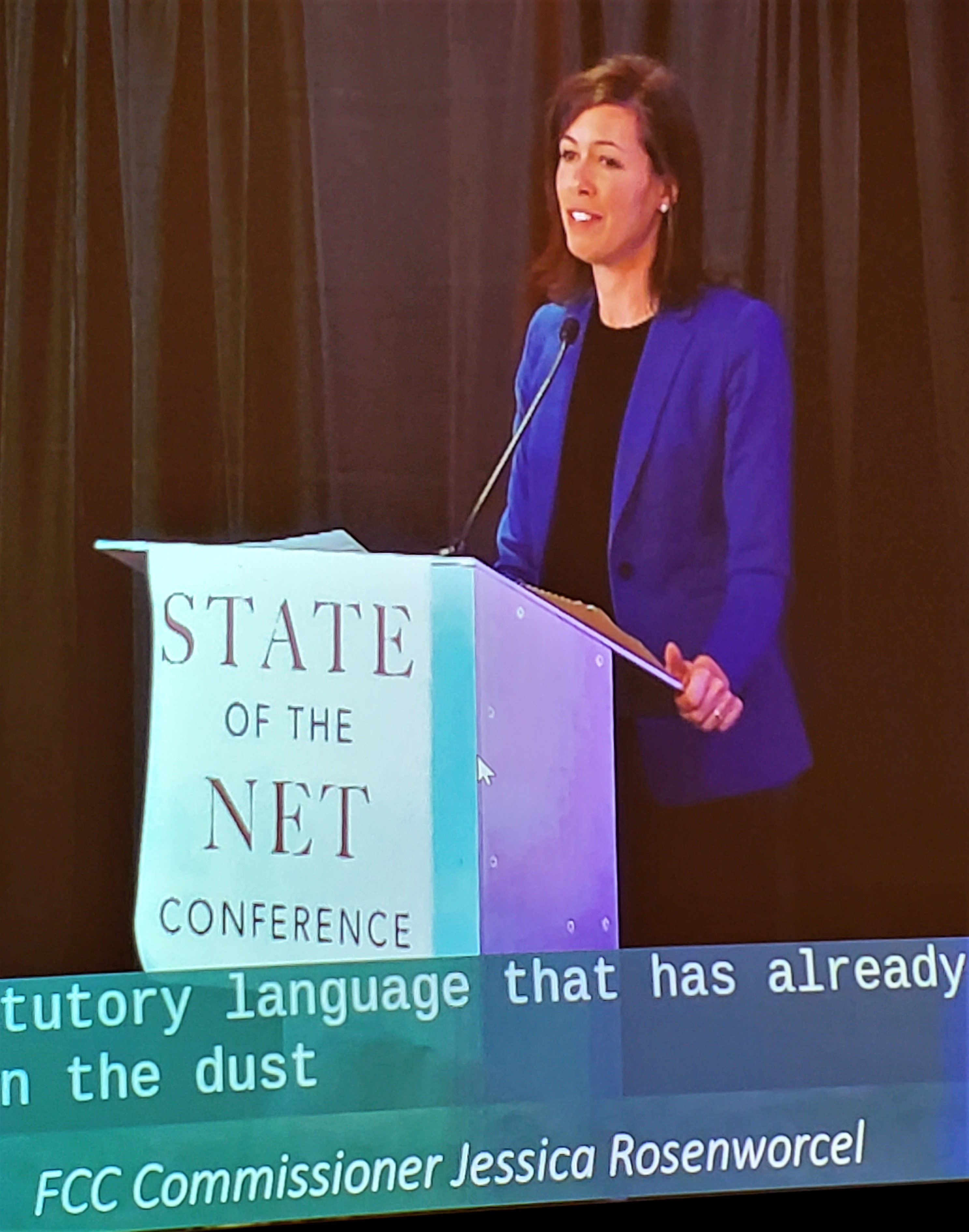Rosenworcel Warns of Potential Presidential Ability to Shut Down the Internet
The smarter way to stay on top of the multichannel video marketplace. Sign up below.
You are now subscribed
Your newsletter sign-up was successful
FCC Commissioner Jessica Rosenworcel, in a passionate keynote speech to the State of the Net annual conference, focused on growing political challenges to internet freedom. Acknowledging the long run of "rosy propositions" about the internet's value, she warned that "this formidable tool can not only bring us together but can divide us, too." She voiced special concern that government-directed internet shutdowns "can stunt the democratic process, threaten human rights, batter economies, and disrupt modern life" - and emphasized that the U.S. President could institute an internet shutdown under current regulations.

Without ever mentioning the incumbent U.S. President by name during her Tuesday, Jan. 28 speech to the annual SOTN conference of policymakers, Rosenworcel's political invective concentrated on what she sees as a potential threat to American free speech similar to actions that have been implemented globally.
"We have discovered what is ugly—that outrage can travel online with a greater velocity than veracity," Rosenworcel said, citing the "terrifying [ways] that this tool for global collaboration can be used to disrupt democracies as surely as it can be used to destabilize dictatorships." She focused on overseas examples, quoting reports that 21 countries shut down the internet 122 times last year.
After a lengthy tale of overseas internet shutdowns, she brought the story to the U.S.
"You might think this is at some distance from what could happen in the United States. But you might want to think again," Rosenworcel said, trying to avoid alarmist rhetoric as she outlined a scenario in which the President could use World War II- era regulations to stifle the web.
She pointed to 1942 revisions of the 1934 Communications Act, known as Section 706.
"Section 706 allows the President to shut down or take control of 'any facility or station for wire communication' if he proclaims 'that there exists a state or threat of war involving the United States,'” she explained noting that wireless communications could be suspended "merely if there is a presidential proclamation of a 'state of public peril' or simply a 'disaster or other national emergency.' There is no requirement in the law for the President to provide any advance notice to Congress."
The smarter way to stay on top of the multichannel video marketplace. Sign up below.
Rosenworcel acknowledged, "These are .... different days."
"Section 706 has not been directly applied to the internet," she said, but quoted a 2010 Senate report that concluded Section 706 “gives the President the authority to take over wire communications in the United States and, if the President so chooses, shut a network down.”
"If a sitting President wants to shut down the internet or selectively cut off a service, all it takes is an opinion from his Attorney General that Section 706 gives him the authority to do so," she said. Citing current "unspoken norms," Rosenworcel contended "that past practice may no longer be the best guide for future behavior. Norms are being broken all the time in Washington and relying on them to cabin legal interpretation is not the best way to go."
With bold political inference, she said, "We should be straightforward."
"We should acknowledge that internet shutdowns can stunt elections and the democratic process, threaten human rights, batter economies, and disrupt modern life," the Democratic Commissioner said, calling for a "modern assessment of this language" in Section 706, reflecting "what it should mean in the digital age."
"The United States should develop a formal policy on government-directed internet shutdowns, informed by the experience of the State Department, National Telecommunications and Information Administration and Federal Communications Commission," she proposed.
"We need to have this discussion if we are committed to an open internet for all," Rosenworcel concluded. "Because without it our own laws could be contorted to support such outages. Because without it we can expect the number of government-directed internet shutdowns to grow."
Contributor Gary Arlen is known for his insights into the convergence of media, telecom, content and technology. Gary was founder/editor/publisher of Interactivity Report, TeleServices Report and other influential newsletters; he was the longtime “curmudgeon” columnist for Multichannel News as well as a regular contributor to AdMap, Washington Technology and Telecommunications Reports. He writes regularly about trends and media/marketing for the Consumer Technology Association's i3 magazine plus several blogs. Gary has taught media-focused courses on the adjunct faculties at George Mason University and American University and has guest-lectured at MIT, Harvard, UCLA, University of Southern California and Northwestern University and at countless media, marketing and technology industry events. As President of Arlen Communications LLC, he has provided analyses about the development of applications and services for entertainment, marketing and e-commerce.

